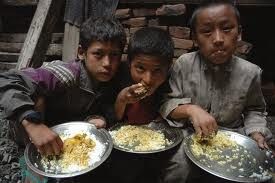The Bangalore Blogger: Don't Be Duped by the Mega-Corps Using World Food Day for Cheap PR
There are a lot of "days" to celebrate worthy causes and civil society uses these to exert pressure on a particular policy or issue, while governments or international agencies use the opportunity to make grand announcements and leverage some action for change.

But it's not just the domain of NGOs or policy makers – corporates – and most likely the over-paid PR gurus in their midst, that increasingly want to get in on the act, highlighting all the good things that companies are doing to solve the world's problems.
World Food Day, thus, seems a great opportunity for some corporate PR.
This year's World Food Day theme is "the family farm", but no matter, why not use it to talk about everything else.
For World Food Day, Nestle CEO Peter Brabek-Letmathe issued a blog arguing that water is the most critical factor for food security. His blog blames water scarcity on speculation, biofuel production, and Saudi Arabia, apparently.
There is, of course, no mention of Nestle's profligate use of water in its manufacturing, which has led to ground water depletion, or promotion of bottled water lines, or the fact that the Nestle CEO argued that declaring water to be a human right is an "extreme solution" to water shortages, pushed by irrelevant NGOs.
Unilever, meanwhile, has partnered with the UN to build a world without hunger through its school meals programme. Through its brand, Knorr, it presumably wants to bring dried powdered soup bases and instant noodle mixes to school children in Kenya, Indonesia and the Philippines, so that children can live without the need to consume those pesky, expensive, water-intensive fresh vegetables, replacing them entirely with salt.
In other corners, Unilever is accused by campaigners of being the very anti-thesis of the "family farm' World Food Day theme, as they are involved in a programme that makes it easier for companies like Unilever to grab land from family farmers, leading to potentially devastating impacts to Africa's small holder food producers.
Lastly, Bayer also got in on the World Food Day Act, tweeting this morning that "Sustainability is at the top of our agenda to counter the challenges of securing food supply." Food supply for whom, we wonder. Bayer is the manufacturer of neonicotinoid pesticides that have been recently banned in the EU, as there is significant evidence that they've caused the death of bees. Canadian beekeepers launched a class action suit in September citing loss of full colonies. There won't be any food supply if we don't have bees to pollinate crops.
© Copyright IBTimes 2025. All rights reserved.






















